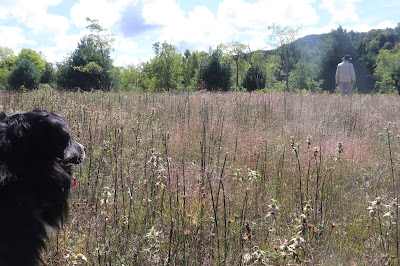 |
| Summer is over vs. Fall is not over yet, OR Fall is beautiful! |
Two Different Ways to Count Blessings
As my blogger/reader/dog lover friend Dawn says, right in the title of her blog, Change is Hard. As I recall, the hard change Dawn initially referred to was a transition from one job to another, and that was years ago now – she is retired now! -- but changes don’t stop coming, as long as we’re alive, and all of us been through a lot of hard changes in this country since Dawn and I connected via our blogs. There have been, of course, other kinds of changes, long anticipated and welcomed. Life just keeps coming at us, one way or another, and we do our best to adapt each day.
 |
| I absolutely love asters! |
When I was young, my friends and I used to say (thinking ourselves very clever), “Someone told me to cheer up because things could be worse. I cheered up – and sure enough, things got worse.” Gallows humor, I suppose, which we could afford because we were, as I say, young and therefore, secretly felt invulnerable. What we find amusing changes as we advance in age….
Anyway, the other morning I had a little epiphany (I don’t know about your epiphanies, but most of mine are little ones), and maybe you’ve read Anne Frank’s Diary of a Young Girl and will recognize my lightbulb moment as the difference between Anne’s way of counting her blessings and her mother’s way. Her mother’s advice when Anne felt gloomy was that she should think of other people whose lives were worse. At the time, the Frank family were living in hiding from the Nazis, but their situation could have been worse -- and became tragically worse when their hiding place was discovered, with only Anne’s father surviving Auschwitz.
Anne, however, even in hiding, was young and full of hopes and dreams and looked for sources of joy rather than other people’s misery to bring herself out of spells of despair. “I don’t think of all the misery, but of the beauty that still remains,” she wrote in her diary. She could not leave the hiding place to go outdoors into nature, her favorite medicine, but she could peep out at the sky: “As long as this exists, this sunshine and this cloudless sky, and as long as I can enjoy it, how can I be sad?”
 |
| Little Pea and I love our outdoor rambles. |
So how can I ever be sad, with my oh-so-fortunate life? But sometimes we all are, and we need to pull ourselves back into the light, so although what I call my little epiphany is one I’ve had repeatedly in the past and repeatedly lost sight of, I was glad to have it again the other day.
Because I’d been despondent over the most recent appearance of the Mr. Hyde side of my dog Peasy’s personality. It’s a side of him that only flashes out briefly, never lasting even sixty seconds, and is much less frequent than when he first came to live with us, but now when he falls off the good-dog wagon in that dramatic and frightening way, even for only a moment, and after weeks of seemingly near-normal behavior, I am plunged into the Slough of Despond! So I called to talk to a woman who has extensive experience with special needs dogs like Peasy, and I did feel not quite so horribly depressed afterward. Some of the dogs she houses, the unadoptables, are so much worse! But there, you see? That is the negative way of counting the blessing that is Peasy: to say he could be "so much worse!" Thinking of his Mr. Hyde self in that comparative way helped me to calm down, but it was no ode to joy! The return to joy took Peasy himself, his daily unquenchable curiosity about the world and his wonderful bounding energy. Whatever his unhappy earlier life, Peasy has become, over time, a mostly happy dog. He loves having a family and a home! And regardless of how he feels about meeting strangers (from nervous to terrified), he is very comfortable and affectionate with us.
 |
| New toy! Mr. Rope! Such fun! Happy boy! |
Recent Reading
Our intrepid Ulysses reading circle met last week to discuss (my choice of book) Virginia Woolf’s The Waves, and we stayed on topic for two hours, everyone agreeing that it had been a brilliant, unusual, and very worthwhile novel for reading and discussion. September’s book will be Chinua Achebe’s Things Fall Apart. I'll be reading that one for the third or fourth time, but it is worth re-reading.
After rather an overload of mostly nonfiction read recently, this morning I finished a long novel, Damnation Creek, by Ash Davidson, recommended to me by my sister. The story is set in redwood country, near the town where my younger nephew presently lives (the author is from Arcata, California, and now lives in Flagstaff, Arizona), and is fairly even-handed in its treatment of the logging industry from the perspective of people who depend on it for their living. I recommend it to anyone who has read The Overstory, not because it takes the "other side” but because it is sympathetic to working people’s needs and at the same time acknowledges serious harms done. Also, it’s beautifully written.
So here are books I’ve read since my last post:
131. Cameron, Peter. Someday This Pain Will Be Useful to You (fiction)
132. Gootwald, Linda. Once Upon a Shelter (nonfiction)
133. Davidson, Ash. Damnation Spring (fiction)
 |
| Fruits of wild roses -- |
























